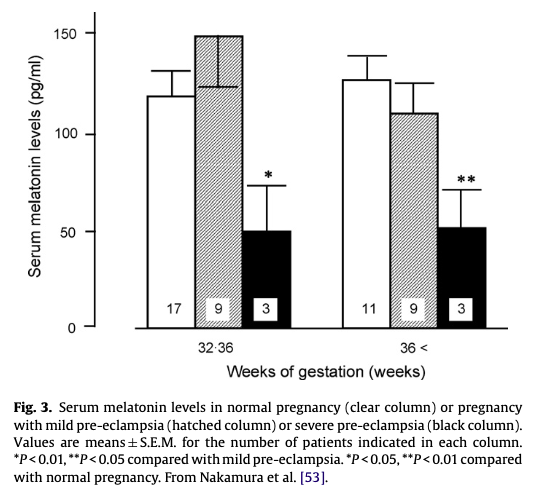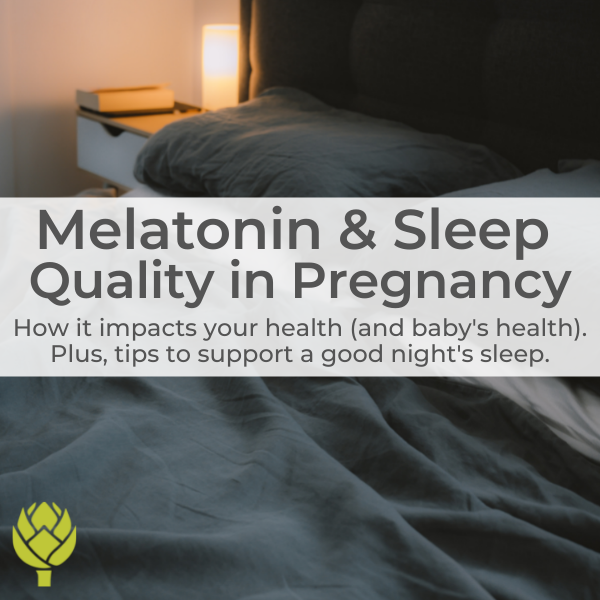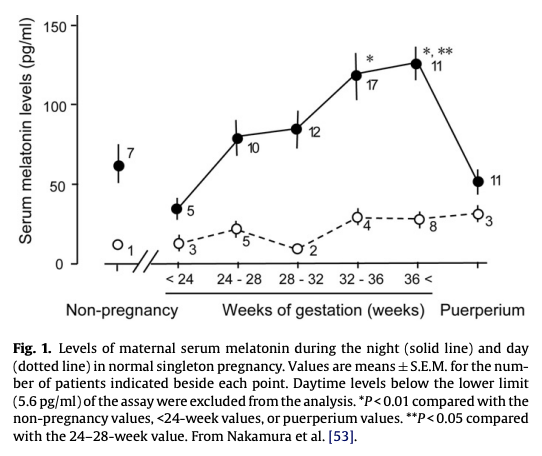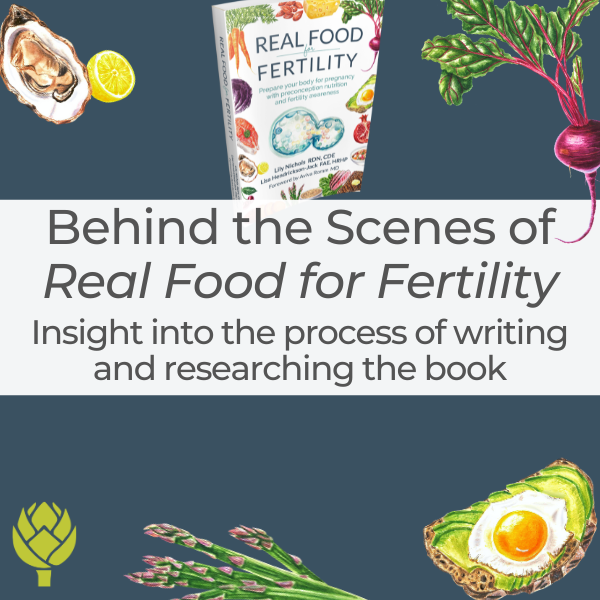How are you feeling today? Well-rested? Totally fatigued? Somewhere in between?
There’s nothing better than a great night’s sleep, but the construct of our modern society doesn’t necessarily set us up for success in the sleep department. Between busy schedules, screen time, spending most of our time inside, and especially young kids (if you have them already), our sleep can really take a hit. Add into this mix a pregnancy full of changes and discomforts and getting a good night’s rest can feel like a foreign concept.
But good sleep doesn’t have to be something unattainable during pregnancy. I’m going to share with you why sleep is important (beyond just feeling energized), how melatonin plays a role, and some tips for improving your circadian rhythm and sleep quality.
Melatonin & Sleep Quality in Pregnancy Is Important
I know, I know – that seems like an obvious headline. But it’s true! Getting enough good, quality sleep (especially during pregnancy) is one of the best ways to keep yourself and your baby healthy in both the short and long term.
Many studies have shown that sleep disturbances of pregnant women were associated with preeclampsia, gestational diabetes, preterm birth, large for gestational age, and cesarean section birth., Not to mention, disturbed sleep in pregnancy is predictive of depression and disturbed postpartum sleep – which is hard enough with a newborn! Sleep disturbances can include anything from frequent waking, obstructive sleep apnea, restless leg syndrome, frequent urination at night, or even general discomfort.
So what impacts sleep quality? How do you improve the quality of sleep you get before and during pregnancy? I share some tips below, but first let’s dive into more about melatonin.
What is melatonin?
Melatonin is the hormone in our bodies that is best known for being the “sleep hormone.” It is produced from the synthesis of tryptophan (a type of protein) from serotonin in the pineal gland of our brains. Melatonin is light-sensitive, and is released in response to darkness and inhibited in response to light. It is secreted right after the onset of darkness, peaks in the middle of the night around 2 to 4 a.m., and gradually falls as the sun rises. This on-and-off nature of melatonin establishes and informs our circadian rhythm, allowing our body to understand that when it’s daytime, it’s time to be active, and when it’s nighttime, it’s time to rest.
This rhythm is important for our sleep cycles, but it also influences a whole host of other physiological functions. There are melatonin receptors all throughout the body and our circadian rhythm influences our immune system, antioxidant defenses, and glucose regulation, too. There is some evidence that melatonin even strengthens the relationship between our core body temperature and sleep-wake rhythms.
Melatonin and pregnancy
Because there are melatonin receptors all throughout the body, you may not be surprised to learn that melatonin also influences reproduction, thanks to the melatonin receptors in our reproductive organs and systems. Preconception, melatonin modulates the production and function of luteinizing hormone and follicle-stimulating hormone – two hormones responsible for ovulation.
Throughout pregnancy, babies rely on their mothers for melatonin via transfer through the placenta. After birth, they continue to rely on mom’s melatonin via breast milk all the way up until 2-4 months after until their melatonin secretion ramps up. If you continue to breastfeed long term, your baby will continue to get melatonin through breast milk as well (milk produced at night is high in melatonin whereas daytime milk is not).
Back to pregnancy though… As you can see, the baby’s circadian rhythm is heavily impacted by its mother’s circadian rhythm. The fetal organs learn to function in a daily circadian manner based on mom’s melatonin production.
The presence of adequate melatonin also has protective effects for the fetus. Melatonin protects the embryo development, regulates and protects DNA synthesis, serves as an antioxidant, and aids in nervous system development.
Melatonin levels increase during pregnancy
When melatonin levels have been assessed during pregnancy, researchers have found that melatonin levels are higher in pregnant women during the first trimester than non-pregnant women. Melatonin levels then increase at 24 weeks and increase again at 32 weeks gestation., You can see an example of this shift in the chart below. In this study, researchers examined melatonin levels during the day and night in 30 singleton pregnant women. Look at the nighttime rise that continues to climb all the way to the 36th week.
While the brain is typically the major source of melatonin production, researchers have found that the placenta can also make melatonin, too. While it isn’t perfectly clear why melatonin levels drastically increase as pregnancy progresses, the results of a 2021 prospective study suggest that the placenta might be the cause of the elevated levels. It’s possible that this is the body’s inherent way of knowing that it’s caring for two bodies, and thus needs to make more melatonin. But, more research is needed to confirm this hypothesis.
Melatonin and pregnancy complications
Beyond controlling our circadian rhythms, melatonin has other useful functions that can reduce the risk of complications in pregnancy. Let’s dive into some of the research on melatonin’s relationship with pregnancy complications:
- Preeclampsia: Melatonin has been most studied in relation to preeclampsia. Preeclampsia is a pregnancy complication that results in high blood pressure and urine protein losses. It occurs in 5-7% of all pregnancies worldwide and, if not managed, can lead to low birth weight, prematurity, and death for the fetus; kidney failure, liver failure, and cerebral edema with seizures for the mother.In pregnancies complicated by preeclampsia, the placenta undergoes higher oxidative stress during pregnancy, producing high levels of free radicals. Without sufficient antioxidants to combat these free radicals, preeclampsia can occur. Melatonin is an antioxidant that can work to reduce the oxidative stress on the body during pregnancy. Studies have shown that women with preeclampsia or growth-restricted fetuses have a significant reduction in serum melatonin levels and placental distribution of receptors. It’s unknown whether this is a cause or consequence of preeclampsia.

- Long-term fetal consequences: Because melatonin is so important for regulating our sleep and waking cycles, a disruption in this circadian rhythm late in pregnancy and/or soon after birth can have impacts on the baby’s long-term health. Research has shown that chronic disruption to the circadian rhythm can lead to reproductive dysfunction and contributes to the development of offspring diseases like metabolic syndrome, obesity, ADHD, and autism later in life.
How to support your melatonin during pregnancy
By now you might be thinking, “I need more melatonin!” Here are a few ways to support melatonin production during pregnancy:
- Nutrition: While your pineal gland is responsible for making melatonin, you can actually get melatonin from foods, too. Melatonin can be produced from the amino acid tryptophan via serotonin. Diets rich in meat, poultry, fish, eggs, and milk, are associated with improved sleep quality, likely because these foods contain high amounts of tryptophan. In addition, cherries, nuts, pineapple, oranges, and bananas have all been found to be sources of melatonin. If you’ve read my book Real Food for Pregnancy, you know there’s a recipe for Tart Cherry Gummies in it. They are the perfect pre-bedtime snack to support optimal sleep (not only does the cherry juice provide a source of melatonin, but the glycine from gelatin can have a calming, sleep-promoting effect as well).
- Dim the lights before bed: Melatonin is inhibited by lights and is released by darkness. As your day is winding down and you prepare for sleep, dim the lights in your house to encourage the release of melatonin. Or, try installing a red light bulb in your bedside lamp or using a salt lamp with a dimmer switch. This will come in handy after your baby is born and you’re tending to them, feeding, or changing diapers in the middle of the night.
- Screen time: I’m probably not the first to recommend this to you, but putting your phone, laptop, tablets, TV, etc. away at least 1-2 hours before bedtime can help bolster the rise in melatonin levels that will help you sleep. All lights suppress melatonin, but research suggests blue light is stronger at suppressing melatonin than white fluorescent lights.
- Blue light blocking glasses: If screens are unavoidable, at least throw on a pair of blue-light blocking glasses after sunset. I know “blue blockers” can look goofy and they might just seem like another biohacker fad that doesn’t work, but there is data showing that they are effective. A 2022 randomized controlled trial showed that pregnant women who wore blue light blocking glasses at night had earlier melatonin release (by 28 min) compared to the control group. Not all blue blocker glasses are created equal (beware of cheap knockoffs on Amazon), but BLUblox brand, which has now re-branded to the name Bon Charge, is a good choice (affiliate link).
- Sleep in a dark room: Since light exposure suppresses melatonin, you want to ensure you’re blocking out any sources of light. Cover digital clocks or lights on electronics and consider blackout curtains for your windows.
- Get early morning sun exposure: If you’re trying to regulate your circadian rhythm, start getting outside early in the morning, such as going for a morning walk. Exposure to sunlight during the day has been found to increase melatonin production at night, and reduce the suppressing impacts of evening light on melatonin secretion. Plus, exposure to bright lights in the morning has been found to encourage greater reduction in cortisol levels (a stress hormone) later in the day – something we want if we’re trying to relax before bed!
Are melatonin supplements safe in pregnancy?
As with many things related to pregnancy, melatonin supplementation is unfortunately understudied. However, a 2021 review did find that “clinical studies to date suggest that melatonin use during pregnancy and breastfeeding is probably safe in humans.” To be on the safe side, talk with your provider if you are considering supplementing.
General tips for improving sleep quality during pregnancy
Even if you’re one of those lucky people who can fall asleep and stay asleep easily, during pregnancy even the best sleepers may notice some unwanted sleep challenges. Since we know sleep quality is extra important during this time, here are a few more tips for improving your sleep quality during pregnancy:
- Discomfort: Let’s face it, late pregnancy can be uncomfortable and finding a good position to lay in may be challenging, especially if your baby likes to kick a lot at night! As your belly grows, you’ll probably feel most comfortable sleeping on your side. Get creative and consider trying a pregnancy pillow or a rolled up towel under your belly or behind your back (or both).
- Nighttime bathroom trips: There’s nothing worse than having to disrupt peaceful sleep because you have to use the bathroom, but it’s often unavoidable during pregnancy as baby puts more pressure on your bladder. Adding electrolytes to your drinks after dinner (but not too close to bedtime) may support hydration and reduce the need for a night time bathroom break. It may sound too good to be true, but many women report fewer trips to the bathroom overnight when they increase their electrolyte intake, especially sodium (salt), potassium, and magnesium. Learn more about the importance of electrolytes in this article. You can try the “electrolyte replenishment drink” recipe in Real Food for Pregnancy (see the recipe appendix) or opt for an electrolyte powder to add to your water, like LMNT. You can get a free sample pack of LMNT here with your purchase. (affiliate link) If you don’t want any flavors or dislike stevia, they have a “raw unflavored” option that works well mixed with water plus a splash of fruit juice.
- Relax before bedtime: Take some time before bed to practice a relaxing ritual. It could be reading a book, listening to some music, doing some light stretching, or anything else that helps you feel at ease. Help your body feel the transition from the busy day into the calm night. If you have achy muscles, soreness, or leg cramps, try a warm Epsom salts bath before bed (in addition to the electrolytes discussed above). You actually absorb some of the magnesium through your skin, and since this mineral aids in muscle relaxation, it may help you get a better nights’ sleep.
- Snack: Your metabolism is revved up during pregnancy, and sometimes, that can mean it’s challenging to get in enough food throughout the day. If you’re waking up hungry in the middle of the night, by all means, get up to eat a snack. But you may want to consider eating more food at dinner and/or a bedtime snack (both of which should feature a source of protein) to hopefully keep you fueled throughout the night. I know there were stages in both of my pregnancies where I needed a middle-of-the-night snack, so if that’s you and you’re already consciously making an effort to eat more food during the day, just roll with it. Some nuts and water at the bedside might help, so you don’t have to actually get out of bed to have your snack.
Summary
- Quality sleep during pregnancy is important for you and your baby’s health.
- Sleep disturbances during pregnancy are associated with a higher risk of certain pregnancy complications, especially preeclampsia.
- Melatonin is the hormone released at nighttime and suppressed in daylight that controls our circadian rhythm. It also supports the immune system, antioxidant defenses, and glucose regulation, too.
- Melatonin levels in pregnancy rise considerably, especially in the second and third trimesters.
- Babies receive melatonin solely from the placenta during gestation and via breast milk after birth. The mother’s circadian rhythm influences the baby’s.
- Disruptions to the circadian rhythm during pregnancy influence a baby’s development and possibly their long term health.
- Melatonin levels can be improved through nutrition, reduction of light before bedtime, and exposure to morning light (daily morning walks, anyone?). You should talk with your provider if you are interested in melatonin supplementation.
- Other tips for improved sleep include using pregnancy pillows, drinking water with electrolytes after dinner, and relaxing before bedtime.
Wishing you all the best sleep you can get!
Lily
P.S. — What tips do you have for more peaceful sleep? Share in the comments!
P.P.S. — Pregnancy sleep is one thing, but postpartum is another. I want to give a quick nod to the importance of reading about biologically normal infant sleep before baby arrives, so you are well-prepared for what to expect. The book, Safe Infant Sleep, by renowned maternal-infant sleep researcher, Dr. James McKenna is a must-read. He coined the term breastsleeping. If you know, you know. 😉
References
- Lu, Qingdong, et al. “Sleep disturbances during pregnancy and adverse maternal and fetal outcomes: a systematic review and meta-analysis.” Sleep medicine reviews 58 (2021): 101436.
- Sedov, Ivan D., et al. “Sleep quality during pregnancy: a meta-analysis.” Sleep medicine reviews 38 (2018): 168-176.
- “Melatonin”. Mayo Clinic, 2022. Online. Internet. 5 Apr. 2022. . Available: https://www.mayoclinic.org/drugs-supplements-melatonin/art-20363071.
- Claustrat, B., and J. Leston. “Melatonin: Physiological effects in humans.” Neurochirurgie 61.2-3 (2015): 77-84.
- Voiculescu, S. E., et al. “Role of melatonin in embryo fetal development.” Journal of medicine and life 7.4 (2014): 488.
- Chitimus, Diana Maria, et al. “Melatonin’s impact on antioxidative and anti-inflammatory reprogramming in homeostasis and disease.” Biomolecules 10.9 (2020): 1211.
- Katzer, David, et al. “Melatonin concentrations and antioxidative capacity of human breast milk according to gestational age and the time of day.” Journal of Human Lactation 32.4 (2016): NP105-NP110.
- Tamura, Hiroshi, et al. “Melatonin and pregnancy in the human.” Reproductive Toxicology 25.3 (2008): 291-303.
- Ejaz, Haroon, et al. “Maternal serum melatonin increases during pregnancy and falls immediately after delivery implicating the placenta as a major source of melatonin.” Frontiers in Endocrinology (2021): 1175.
- Pereira, Nádia, et al. “Influence of dietary sources of melatonin on sleep quality: a review.” Journal of food science 85.1 (2020): 5-13.
- Sae‐Teaw, Manit, et al. “Serum melatonin levels and antioxidant capacities after consumption of pineapple, orange, or banana by healthy male volunteers.” Journal of pineal research 55.1 (2013): 58-64.
- Hanifin, P., et al. “Blue light from light-emitting diodes elicits.” J Appl Physiol 110 (2011): 619-626.
- Liset, Randi, et al. “A randomized controlled trial on the effect of blue-blocking glasses compared to partial blue-blockers on melatonin profile among nulliparous women in third trimester of the pregnancy.” Neurobiology of sleep and circadian rhythms 12 (2022): 100074.
- Adamsson, Mathias, Thorbjörn Laike, and Takeshi Morita. “Annual variation in daily light exposure and circadian change of melatonin and cortisol concentrations at a northern latitude with large seasonal differences in photoperiod length.” Journal of physiological anthropology 36.1 (2017): 1-15.
- Jung, Christopher M., et al. “Acute effects of bright light exposure on cortisol levels.” Journal of biological rhythms 25.3 (2010): 208-216.
- Gomes, Patrícia Rodrigues Lourenço, et al. “Maternal pineal melatonin in gestation and lactation physiology, and in fetal development and programming.” General and Comparative Endocrinology 300 (2021): 113633.











Thank you for the informative article, Lily!
I’ve been using f.lux on my laptop for years now. It filters blue light based on time of day and can be customized based on individual needs. It might take some getting used to initially but I find it super useful.
I should have mentioned that in the article. I’m a big fan and long term user of f.lux too!
I’m 25 weeks pregnant and for the past 2-3 weeks I’ve been having sleep disturbances, mostly I’ve been waking up a few times during night and in the morning with my arms and hands feeling numb and/or sore. I’ve read it’s because of fluid retention but I’m wondering if I should check something else. My blood pressure is normal, but I’m a little bit worried.
Now I’m super worried that my disrupted sleep in late pregnancy is going to hurt my baby’s health. I had a terrible time sleeping and my doctor told me no melatonin supplement. I didn’t take any sleep aids either like unisom. I’m now almost 9 months postpartum- I hope my baby will be okay.
I wouldn’t worry! Sleep disruption at the end of pregnancy are very common.
Great article- thanks for all the tips!
Can you share more about the salt lamp/red lightbulb? I have never heard of these
Look up a Himalayan salt lamp and you’ll see. They give a nice orange glow and usually have a dimmer light, so it’s a great options for transitioning to bedtime (keeps the light soft and low). A red light bulb accomplishes a similar thing, but you can put them in essentially any lamp that takes a normal light bulb.
Thank you! I have found electrolyte drinks really helpful for preventing cramping legs/ swelling. I am 29 weeks and have been having a few a week since 18 weeks and it’s been great! I use LMNT.
I should add- the cramping and swelling were impacting me mostly at night, hence the better sleep since
I have a lot of issues sleeping, and as much as l like your articles, they completely stress me out at the same time. Now I’m extremely worried my sleep issues are effecting baby long term. I already worry about not having the perfect diet as well. Your food advice is helpful, but who can possibly eat 1 egg every single day?!? It’s informative but completely overwhelming to read your articles.
I understand that not all information is helpful to all people. Or, sometimes information comes in at a time when we’re not ready or able to receive it. I respect your need to step away from any external sources of information (including all of my writing) and simply focus on what is working for you and maintaining your well being. Wishing you well. <3
I’ve personally noticed that when I finish up my electrolytes in late afternoon and after dinner – I make fewer bathroom trips at night. You wrote that many women report that.
Why is that? Just generally due to lower fluid loss due to salts? Or something deeper? Can’t find more info on that.
Thank you!! Really appreciate your book.
Electrolytes help you stay hydrated (hold on to the water your body needs) instead of getting the signal that electrolyte levels are dropping too low and therefore your body needs to excrete what it perceives as “excess” water. More on electrolytes and pregnancy in this article: Electrolytes & Pregnancy: Why these minerals are crucial and how to get enough
Thanks for the article! While I did many of the suggestions above, I also took a unisom every single night. Sleep was something I couldn’t be lacking as a mom to two others and also being older. It was one of the most important things I did for myself during pregnancy. Seemed to work well as it was my healthiest pregnancy yet. Now 8 weeks postpartum I am sleeping fine until baby wakes me up to eat!
Glad to hear you worked with your provider to find a solution! <3
Excellent article, thank you Lily!
LMNT has worked great for me. I brew a large 1 liter tumbler of tea and add it in there in the morning and drink it throughout the day. Citus flavor is my go to.
I second your point on understanding biologically normal infant sleep & the power of breastsleeping!
My son is 12 months old and we continue to breastsleep and I get so much more rest and he keeps the milk supply up despite my having returned to work 5 months ago.
Tracy of Raised Good has an excellent course, The Sleepy Baby, explaining and optimizing biologically normal infant sleep. I loved it and am so grateful I had that knowledge going in!
Yes, yes, yes!
Hi Lily!
Love your articles, thank you for all you do!
I’m curious about shift workers. I’m about to start a night time position as a new nurse. Any tips for those who work nights?
Magnesium before bed is also super helpful for relaxing the body.
Thanks for the articles and the book recommendation! Love your blog articles. They are so thorough and the research is presented very well.
I share them with friends and family.
I love your articles. Thank you for all of the evidence-based tips! I take 400mg magnesium glycinate about an hour before bed and it helps with my sleep significantly. My OB said there is essentially no upper limit of magnesium since your body easily excretes any excess. He has heard of other people taking up to 1500mg!